Ben van Berkel (born 1957) is a Dutch architect; founder and principal architect of the architectural practice UNStudio.
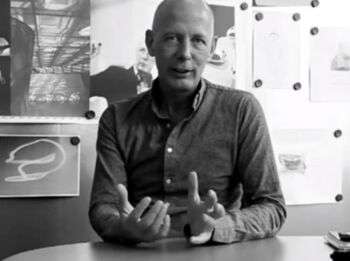
Image source: https://en.wikipedia.org/wiki/Ben_van_Berkel#/media/File:Ben_van_Berkel_portret,_2017.jpg
Berkel’s Early Formation and Approach to Architecture
Ben van Berkel studied architecture at the Rietveld Academy in Amsterdam and at the Architectural Association in London, receiving the AA Diploma with Honours in 1987. One year later, in 1988, he founded the Van Berkel & Bos Architectuurbureau with the Caroline Bos, extending their theoretical and writing projects to the practice of architecture. That same year he co-founded UNStudio (United Net) and began to lecture and teach at several architectural schools around the world. Currently, he holds the Kenzo Tange Visiting Professor’s Chair at Harvard University Graduate School of Design, focusing on teaching the inclusive approach of architectural works integrating virtual and material organization and engineering constructions. In 2018 he founded UNSense, an Arch Tech company based in Amsterdam that designs and integrates human-centric tech solutions for the built environment.
Van Berkel & Bos Architectuurbureau
In 1988 Ben van Berkel and Caroline Bos set up an architectural practice in Amsterdam named Van Berkel & Bos Architectuurbureau, which realized, amongst other projects, the Erasmus Bridge in Rotterdam, Museum Het Valkhof in Nijmegen, the Karbouw office building, the Moebius house and the NMR facilities for the University of Utrecht.
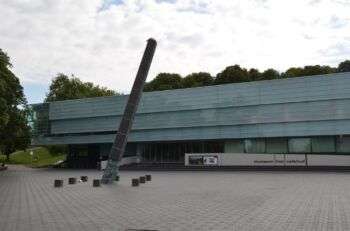
Image source: https://search.creativecommons.org/photos/c775346b-ddf0-4d02-9e80-59c3874f3c97 by Following Hadrian
UNStudio
In 1998 van Berkel and Bos relaunched their practice as UNStudio, the UN standing for “United Network“. UNStudio presents itself as a network of specialists in architecture, urban development, and infrastructure.
With UNStudio van Berkel realized, amongst others, the Mercedes-Benz Museum in Stuttgart, Arnhem central Station in the Netherlands, the Raffles City mixed-use development in Hangzhou, the Canaletto Tower in London, a private villa up-state New York and the Singapore University of Technology and Design.
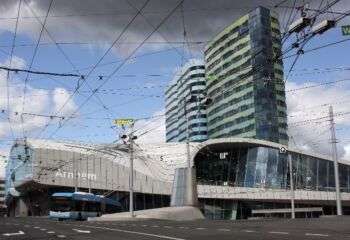
Image source: https://en.wikipedia.org/wiki/Arnhem_Centraal_railway_station#/media/File:23_april_2016_CS_Arnhem.jpg
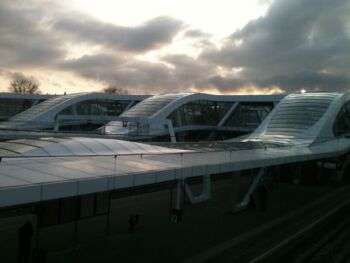
Image source: https://search.creativecommons.org/photos/db4024bb-dc99-406a-bd6a-a47979c5ad57 by TijsB
Famous Works: The Erasmus Bridge
While working at the Architectuurbureau Ben van Berkel was commissioned with the building of a bridge across the New Meuse. He designed the Erasmus Bridge, a combined cable-stayed and bascule bridge in the center of Rotterdam, connecting the north and south parts of the second largest city in the Netherlands. The bridge was named after Desiderius Erasmus, a prominent Christian renaissance humanist also known as Erasmus of Rotterdam.
The bridge is 802-meter long while the cable-stayed bridge section has a single 139-meter-high asymmetrical pale blue pylon with a prominent horizontal base, earning the bridge its nickname “The Swan”. Additionally, the southernmost span of the bridge has an 89-meter-long bascule bridge for ships that cannot pass under the bridge. The bascule bridge is the largest and heaviest in Western Europe and has the largest panel of its type in the world.
After costing more than 165 million Euros to construct, the bridge was officially opened by Queen Beatrix on September 6, 1996. Shortly after the bridge opened to traffic in October 1996, it was discovered the bridge would swing under particularly strong wind conditions. To reduce the trembling, stronger shock dampers were installed.
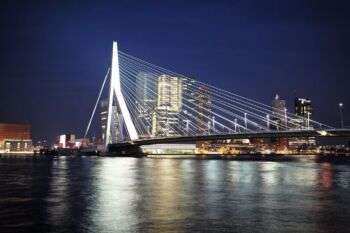
Image source: https://search.creativecommons.org/photos/a17a1549-d459-4518-9d46-c0e2890505b3 by *rboed*
Famous Works: Mercedes-Benz Museum
The Mercedes-Benz Museum, designed by van Berkel with the UNStudio, is an automobile museum in Stuttgart, Germany. It covers the history of the Mercedes-Benz brand and the brands associated with it.
The building is based on a unique cloverleaf concept using three overlapping circles with the center removed to form a triangular atrium recalling the shape of a Wankel engine.
The building’s height and “double helix” interior were designed to maximize space, providing 16,500 square meters of exhibition space on a footprint of just 4,800 square meters.
The building was completed and opened on 19 May 2006.
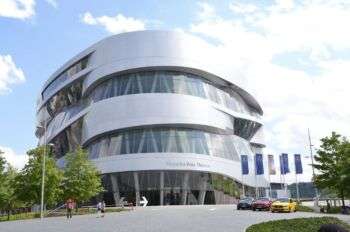
Image source: https://search.creativecommons.org/photos/37502c63-b3ae-427b-975c-b3681358e6ab by Simon_sees
Info sources:
https://www.unstudio.com/team
https://en.wikipedia.org/wiki/Ben_van_Berkel
https://en.wikipedia.org/wiki/Erasmusbrug
https://en.wikipedia.org/wiki/Mercedes-Benz_Museum
